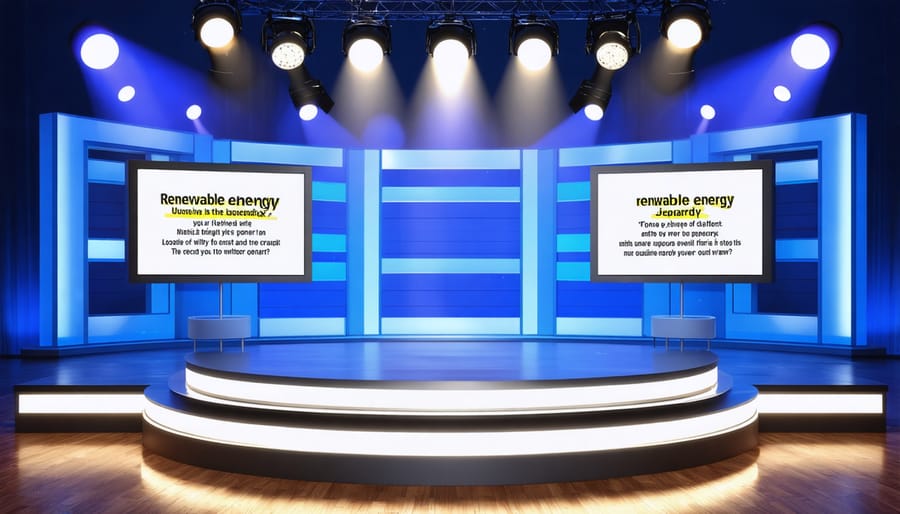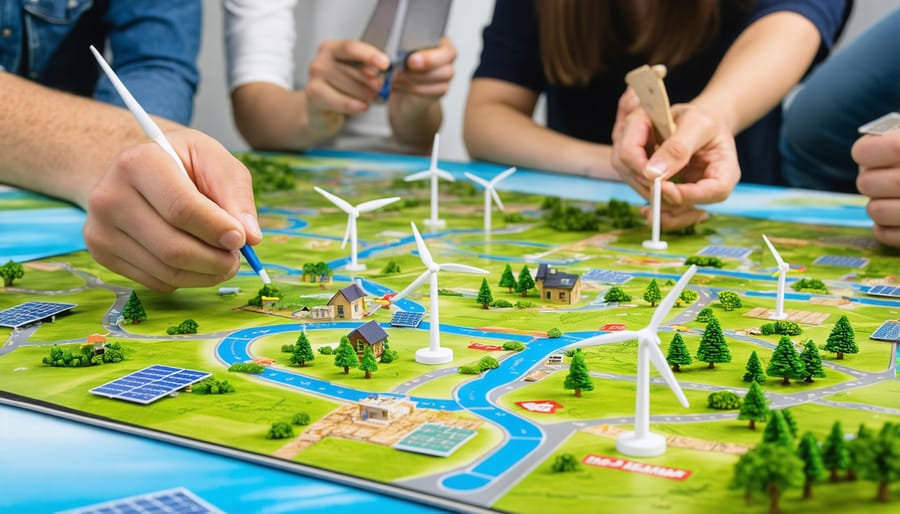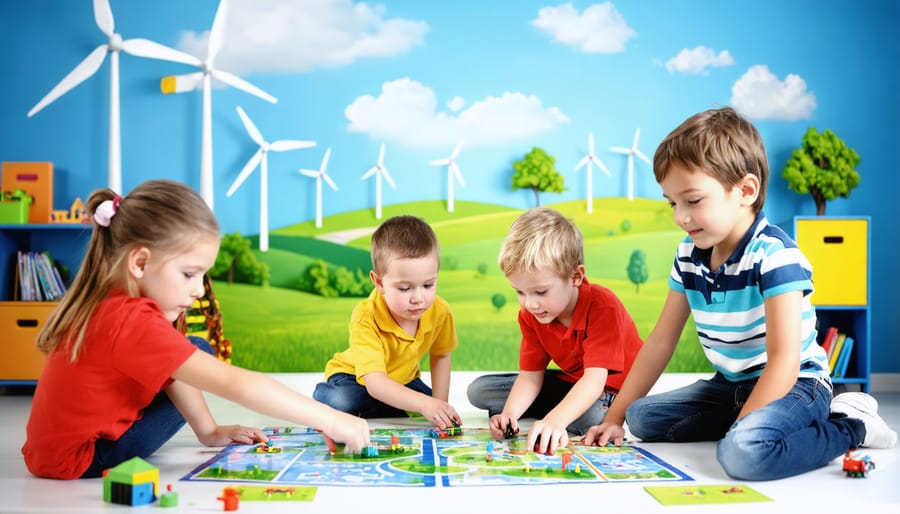Harness the power of play to make renewable energy concepts stick with engaging review games. Review game templates like Jeopardy!, Bingo, and Trivia Races transform complex topics into interactive challenges that boost retention. Align games with key learning objectives on the sustainability of renewable energy, from solar and wind to geothermal and hydropower. Incorporate hands-on elements like model building or role-playing to deepen understanding. Keep games fast-paced, collaborative, and focused on practical applications to maximize engagement and real-world relevance. With creative review strategies, you’ll spark curiosity, reinforce knowledge, and inspire the next generation of renewable energy innovators.
Renewable Energy Jeopardy

Sample Categories and Questions
Here are some engaging categories and questions to include in your renewable energy review game:
Solar Energy: What is the photovoltaic effect? How do solar panels convert sunlight into electricity? Which countries lead in solar power generation?
Wind Power: What factors influence wind turbine efficiency? How do offshore wind farms differ from onshore installations? What is the largest wind farm in the world?
Hydroelectric Energy: How do run-of-river systems generate electricity? What environmental considerations are involved in dam construction? Which country produces the most hydropower?
Geothermal Energy: What drives geothermal activity? How are enhanced geothermal systems (EGS) expanding accessible resources? What is the oldest operating geothermal power plant?
Bioenergy: What are the main types of biomass used for energy? How does anaerobic digestion produce biogas? What sustainability concerns exist around biofuels?
Energy Storage: Why is storage crucial for renewable energy integration? How do pumped-storage hydropower systems work? What emerging battery technologies show promise for grid-scale storage?
Renewable Energy Pictionary

Word List Ideas
Here are some renewable energy terms that work well for a lively game of Pictionary: solar panels, photovoltaic cells, concentrated solar power, geothermal vents, biomass, biofuels, hydroelectric dams, tidal power, wave energy converters, and wind turbines. You can also include broader concepts like renewable energy credits, net metering, smart grids, energy storage, and the circular economy. Mix in a few challenging ones like pyrolysis, anaerobic digestion, or piezoelectric effect to keep players on their toes! The key is selecting terms that can be visually represented while sparking discussion about the incredible potential of clean energy technologies.
Renewable Energy Charades
Acting Prompt Examples
Here are some creative acting prompt examples for renewable energy review games:
Pretend to be sunlight particles hitting a solar panel and getting converted into electricity. Act out wind turbine blades spinning in the breeze to generate clean power. Simulate the process of geothermal energy by having students represent heat from the Earth’s core rising to the surface. Portray the water cycle that enables hydroelectric dams to produce renewable energy. Have students link arms to illustrate a complete circuit in a hydrogen fuel cell car. Through expressive movements and teamwork, these prompts engage students kinesthetically with key renewable energy concepts.
Renewable Energy Trivia Relay
The Renewable Energy Trivia Relay is an exhilarating, team-based game that challenges students to quickly recall and apply their knowledge of renewable energy concepts. To set up the game, divide the class into teams and have them line up at one end of the room. At the other end, place a buzzer or bell for each team. The teacher reads out a series of renewable energy trivia questions, and the first student from each team races to hit their team’s buzzer and answer correctly. If the student answers incorrectly, they must return to their team’s line, and the next student takes their turn. The first team to answer a set number of questions correctly wins the relay. This fast-paced, competitive format encourages students to review and reinforce their understanding of renewable energy topics, such as solar, wind, hydro, and geothermal power. By adding an element of physical activity and team collaboration, the Renewable Energy Trivia Relay makes the review process more engaging and memorable. Students are motivated to study the material thoroughly in order to contribute to their team’s success, fostering a sense of camaraderie and friendly competition that enhances the learning experience.
Renewable Energy Board Game Challenge

Game Design Tips
To create engaging renewable energy review games, consider transforming key facts into trivia questions or matching challenges. Incorporate physical movement by having students collect or sort game pieces representing different energy sources. Simulate real-world scenarios through role-playing or strategic decision-making games where players manage resources and balance environmental impact. Collaborative elements like team challenges foster discussion and problem-solving. Vary the format to cater to different learning styles, from visual puzzles to hands-on building tasks. Above all, prioritize fun and friendly competition while reinforcing the importance of sustainability. With creative game design, students will be eager to showcase their renewable energy knowledge.
Conclusion
Renewable energy review games provide an engaging and effective way to reinforce key concepts about sustainability in the classroom. By transforming complex topics into interactive experiences, students are more likely to retain information and develop a genuine interest in renewable energy. These games encourage critical thinking, problem-solving, and collaboration among learners, fostering essential skills for the 21st century. Moreover, incorporating elements of fun and friendly competition creates a positive learning environment where students feel motivated to participate and excel. As educators, embracing innovative teaching methods like renewable energy review games can make a significant impact on shaping the next generation of environmentally conscious citizens. We encourage teachers to experiment with these activities in their classrooms, adapting them to suit their students’ needs and learning styles. By making sustainability education more engaging and memorable, we can inspire young minds to become active participants in the global transition to a cleaner, greener future.









